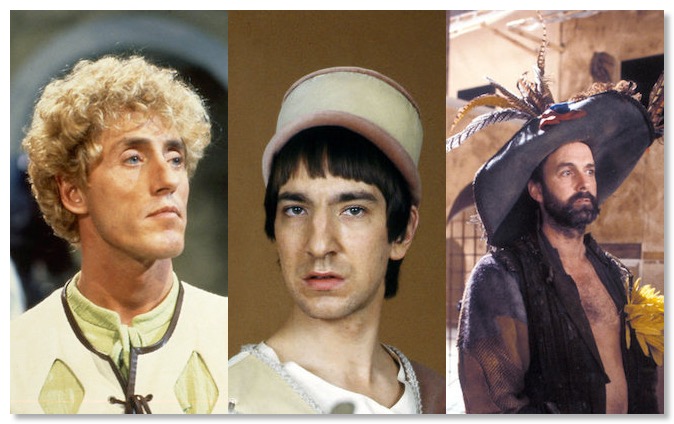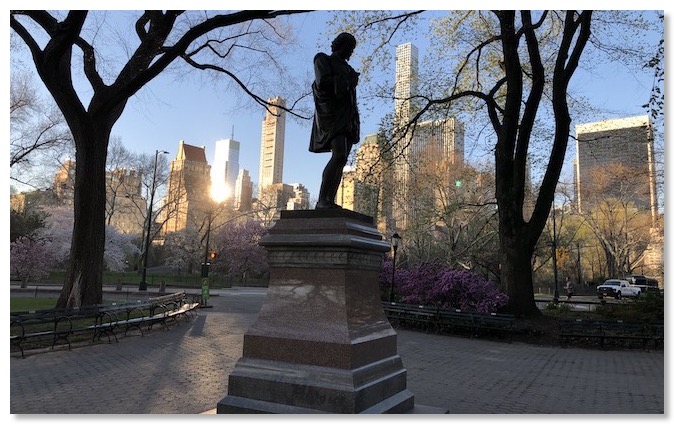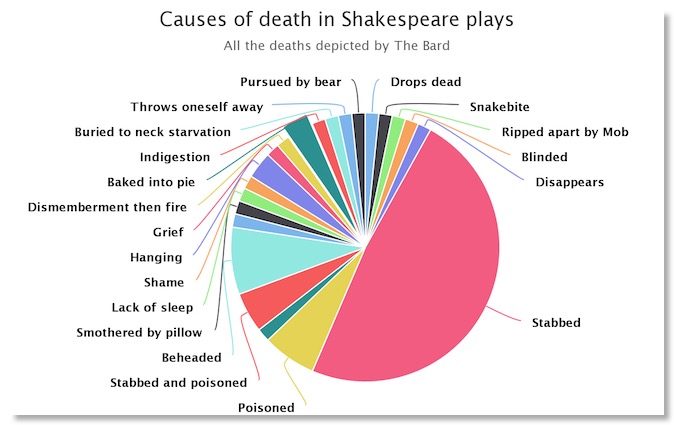April 2018
The Uncertain Bugle
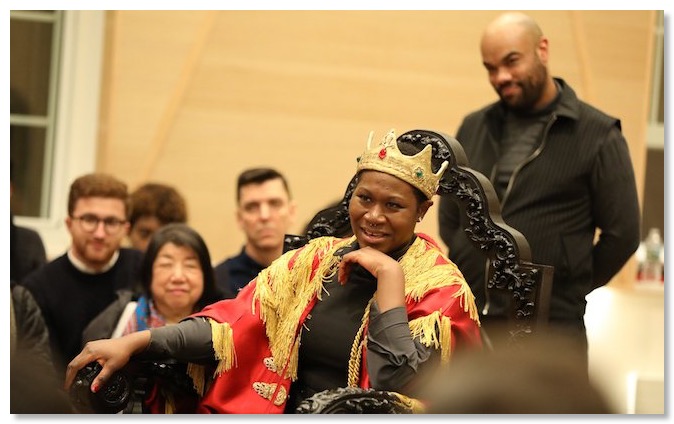
Henry V seems to get staged much more in England, no doubt as a result of its note of defiance against great odds that came in useful not just at Agincourt, but during the early stages of World War II. This lukewarm review of The Public's production (by their Mobile Unit) praises the casting, but criticizes the staging. Still, good to see Henry V performed in the US.
Selfie Taught
April/30/2018 18:16 Shakespeare | Shakespeare Resource | Pedagogy | Shakespeare in Translation | Educational Resource
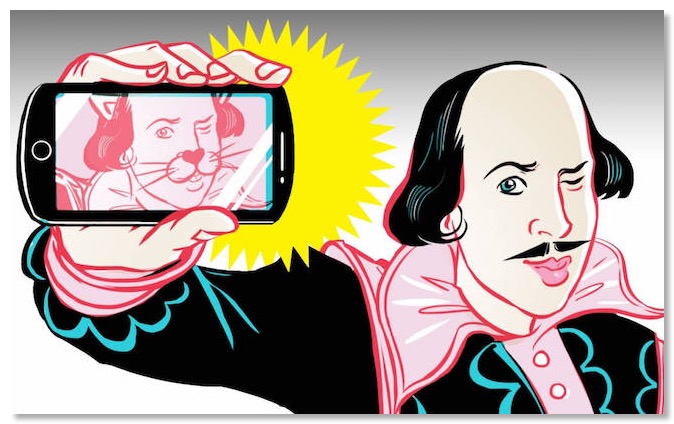
The Canadian Broadcasting Corporation just closed submissions for its Shakespeare writing contest entitled the Selfie Student Writing Challenge, a simple idea where students are asked to write a soliloquy or monologue in Shakespearean style of up to 400 words, on some modern subject or pop culture issue. It may be simple, but it's clever too, and perhaps worth putting into your school's curriculum…
Will Shakespeare, Mastermind
April/25/2018 10:07 Shakespeare | Humor
A tongue in cheek look at Will Shakespeare as a quiz show contestant — a couple of clever jokes in there.
Lord Strange's Men

The Globe (on London's south bank) and Stratford are two of the best known Shakespeare playhouses, but now a third is being build in one of England's poorest neighborhoods, as part of a revitalization plan. The 350-seat Shakespeare North Playhouse will be up and running in Prescott by 2020, and builds on a historical precedent: a playhouse was built there in 1593, though there is no evidence (yet) that Shakespeare ever visited it. Even better for this wonderful story: the replica globe will be build using materials and props built for Shakespeare in Love. Oh, and the title? The original playhouse was built with money provided by the Earls of Derby, and they also sponsored a troupe, called Lord Strange's Men.
Happy Birthday, Will!
April/23/2018 14:31 Shakespeare
To Stay, or Not To Stay...
April/22/2018 09:42 Shakespeare | Shakespeare's Relevance | Merchant of Venice | Romeo and Juliet | Politics and Orwell | Othello | In every day use
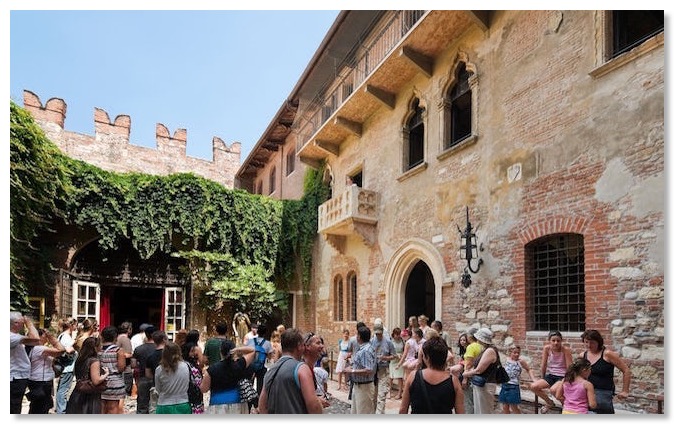
Guardian columnist William Keegan deftly suggests that Shakespeare would have voted for England to stay in the European Union, largely on the basis of all the plays that Shakespeare admiringly set in Europe — chiefly, of course, Italy — Romeo and Juliet (Julite's balcony in modern day Verona pictured above), Othello, Merchant of Venice, to name just three. Of course, one could just as easily suggest that Shakespeare championed England as a standalone and defiant entity in a sea of European wars (The Henriad) — but on the day before his birthday, let's go with Keegan's view!
AMND, in ASL
April/17/2018 15:36 Shakespeare | Shakespeare in Translation | Interpretation | Shakespeare's Relevance | Language | A Midsummer Night's Dream | Performance

Great news article out of Washington, on a production of A Midsummer Night's Dream, that will be co-produced in English and American Sign Language. Yet another barrier broken down.
Stamp of Approval (Part 2)
April/10/2018 15:50 Shakespeare | Graphics | In every day use | Hamlet | King Lear | Henry VI | The Tempest | Romeo and Juliet | A Midsummer Night's Dream | Richard III | Macbeth | Coriolanus
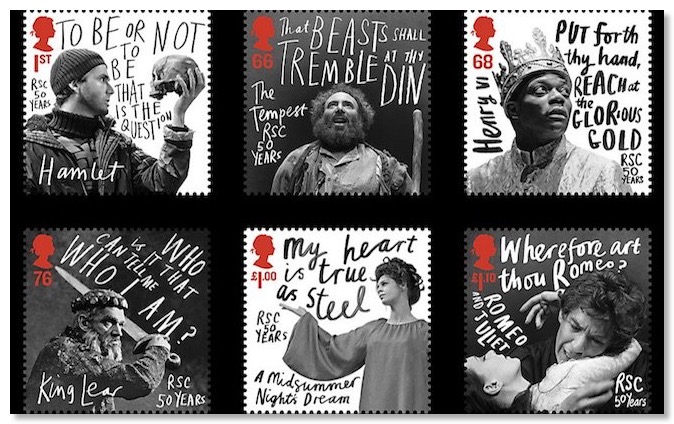
Our first post on commemorative stamps got us interested in how Shakespeare is represented on postage stamps. So we dug around, and found two things. First, from Hat Trick Designs and Marion Deuchars, this series of six stamps that came out in 2011 to commemorate the 50th anniversary of the Royal Shakespeare Company's founding. Starting at top left, here is the key to actors and plays respectively: David Tennant (Hamlet), Anthony Sher (The Tempest), Chuk Iwuji (Henry VI), Paul Scofield (King Lear), Sarah Kestelman (A Midsummer Night's Dream) and Ian McKellen and Francesca Annis (Romeo and Juliet).
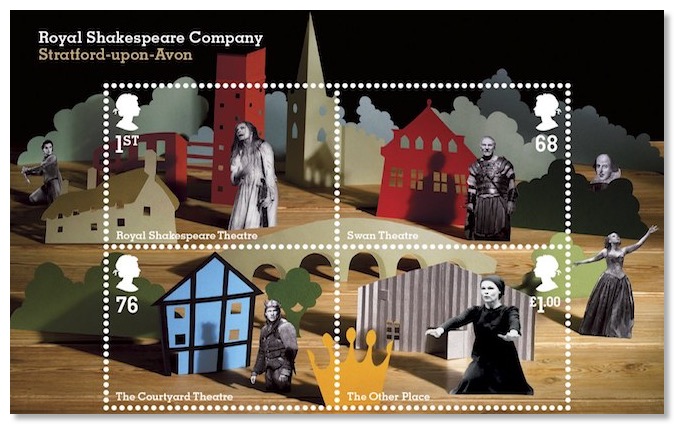
From the same anniversary, and with the aid of illustrator Rebecca Sutherland, a set of four stamps, in a very different style, showing the four Stratford on Avon theaters. The actors are harder to identify, but we think they are, from top left and going clockwise: Francesca Annis, Patrick Stewart, Ian McKellen, and Judy Dench.
Stamp of Approval (Part 1)
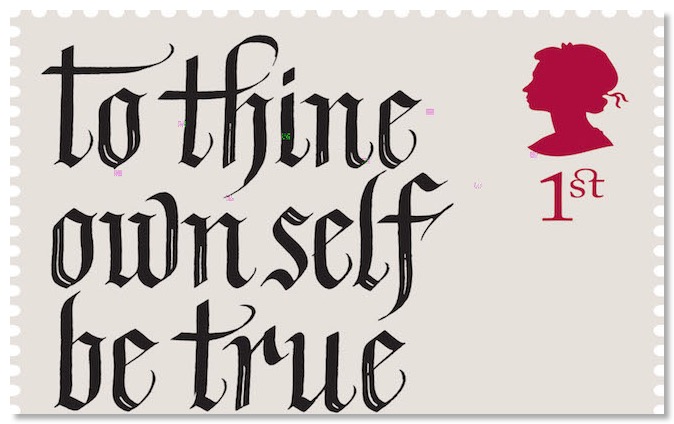
Almost exactly two years ago, in 2016, the Royal Mail issued ten commemorative stamps celebrating Shakespeare's 400th anniversary. Scholar Sir Jonathan Bate chose quotes from Hamlet, Romeo and Juliet, and Julius Caesar. Have a look at what other plays and sonnets made the cut.
Spring is Sprung (Timing is Everything)
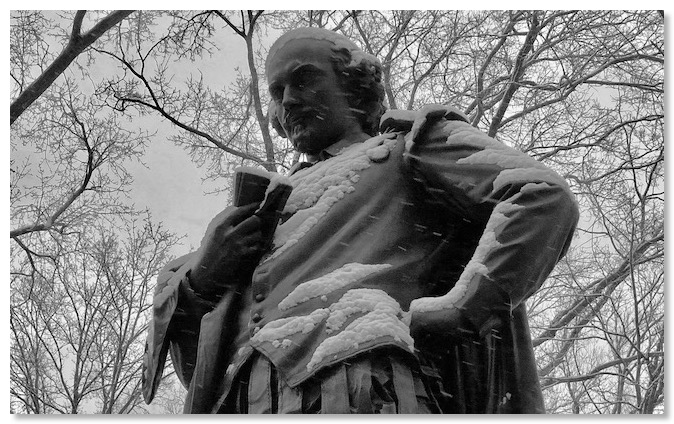
A New York-centric post today. Did you know that a subset of the flowers in the Shakespeare Garden in Central Park (tulip, narcissus and fritillaria) are timed to bloom on April 23 -- Shakespeare's birthday? You do now! Read here for more.
Shylock -- Victim or Scoundrel?
April/05/2018 17:28 Merchant of Venice | Shakespeare | Interpretation | Shakespeare's Relevance | Anti Semitism | Stephen Greenblatt | Scholarship | Stars Playing Shakespeare
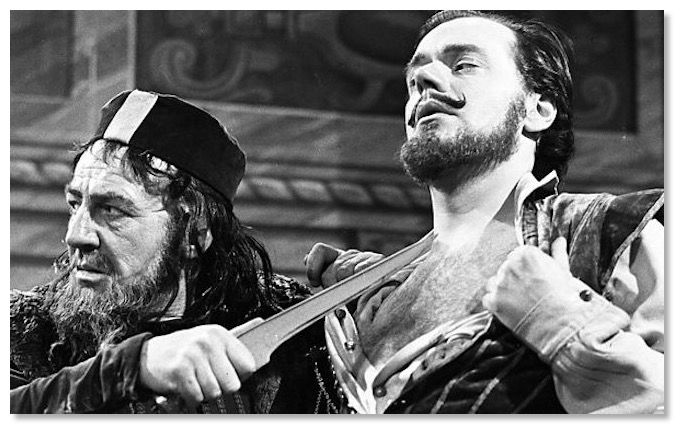
The classic "gotcha" Shakespeare question: "What is the Merchant of Venice's name?" — not, as many think, Shylock, but Antonio, which in itself indicates how Shylock has dominated our imagination about the meaning and nature of the play. But, as this interview with Howard Jacobson (talking here in 2016 about his book Shylock Is My Name) reveals, what we think about the play — and Shylock — is extremely hard to pin down. Which reveals, yet again, the genius of Shakespeare…
Unsex Me Here
April/02/2018 18:26 Shakespeare | David Crystal | Language | Scholarship | Textual Analysis | Shakespeare Resource | Macbeth | Educational Resource
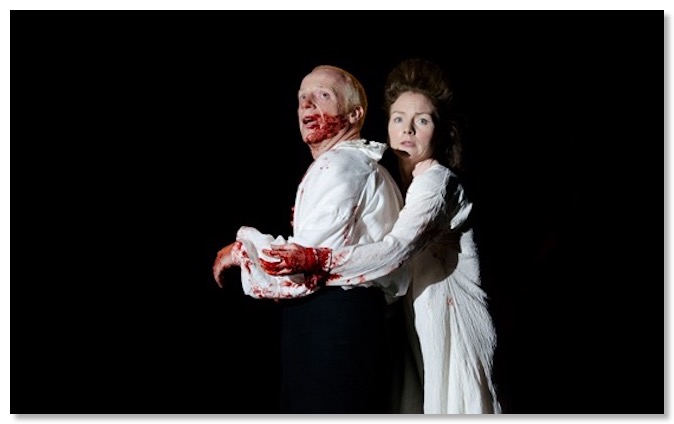
David Crystal, noted linguist and father of the excellent Ben Crystal, lays out in great and fascinating detail the words and phrases that Shakespeare brought to life in Macbeth. That one man could produce (and have adopted into the vernacular) so many great and powerful words and phrases in just one play, is simply astonishing. For teachers helping students grapple with Shakespeare's language, this really is a wonderful article.
Apparel Oft Proclaims the Man...
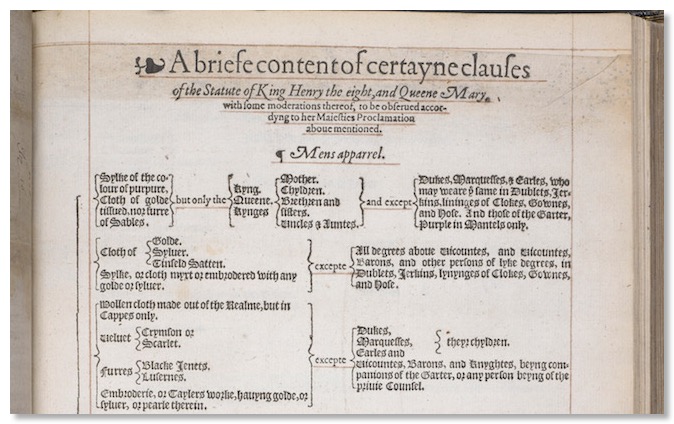
We often hear from students who use our Shakespeare eBooks, and one recurring question we get is: "Why do the actors wear modern dress, when the plays are set long ago?" There are several answers to this question (which can often drive a productive class discussion), including the idea that we were focused less on theater with a capital "T", and more on language and diction; that by removing one aspect of cognitive dissonance, we allow students to focus more on diction and rhyme; and that the "neutral" use of clothing allows students to more easily imagine how they might dress the actors, to further their directing goals.
However, the point of this post is to introduce the idea that Elizabethan England lived under a set of (to us at least) very stringent dress codes (also called sumptuary laws), which worked along class and wealth lines. To learn more about this, enjoy Liza Picard's excellent article on the subject.
Shakespeare's Education
April/02/2018 18:11 Shakespeare | Contemporaries | Scholarship | Shakespeare's Own Life | Shakespeare Resource | Educational Resource
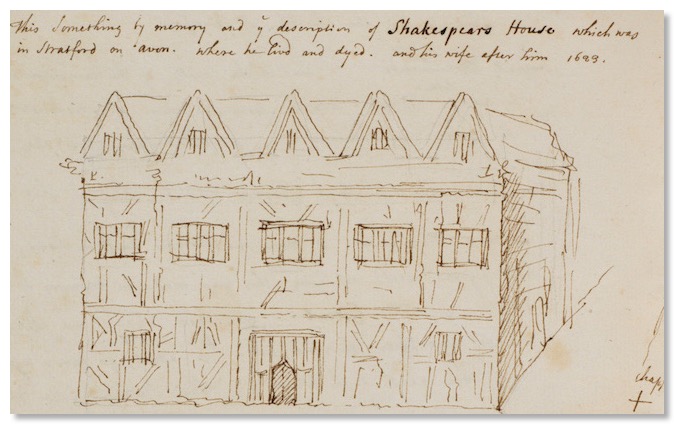
Just as many students today must read Shakespeare at school, so of course at one time, Shakespeare had to attend school, and read the notes and play writes of that era. This brief but detailed article by noted English actor Simon Callow nicely outlines the educational world and childhood Shakespeare likely experienced. And the schooling did not seem either easy, or particularly broad, as he notes in this passages: "They didn’t study history, they didn’t study mathematics, they didn’t study geography, they didn’t study science. They studied grammar, from dawn to dusk, six days a week, all the year round. Grammar – Latin grammar. They translated from Latin into English and from English into Latin. At school, ordinary conversation was in Latin; any boy caught speaking English was flogged. And they mastered the tropes of rhetoric, from antimetabole (where words are repeated in inverse order) to zeugma (where one verb looks after two nouns)."
Roger, Alan, and John
April/02/2018 13:48 Shakespeare | Romeo and Juliet | Taming of the Shrew | Stars Playing Shakespeare

There's a usual crew of actors we expect with Shakespeare (Gielgud, McKellen, Stewart, Dench, etc…) This list of 12 unexpected actors playing Shakespeare makes a change, even though the list does contain one person at least with whom we very much associate Shakespeare — Dame Helen Mirren. Still, there are some unexpected names on the list — the image above gives you a clue to three of them, and the visual answer is below. Enjoy.
